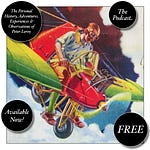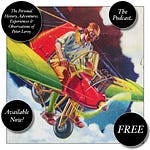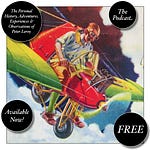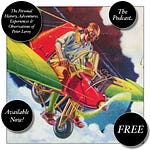“He had a pad of paper mounted on a board that he held in the crook of his arm—like this—and in a hole in the board a pot of paint. Black paint. One big brush. And he would make his pictures with big gestures—like this—big swooping gestures. His pictures often appeared in the papers, too. Very often. People always laughed, even the people he drew. They were flattered to have him make their pictures. They were happy to join in the laughter at themselves because—because they were—people. We like attention, you know, people, and we know how ridiculous we are. It’s one of the ways you can spot us. You catch us laughing, and you know we’re human.” She leaned toward me through the smoke. “It’s a dead giveaway,” she said.
She poured a little more into the tiny tumbler.
“Then those Fascists came in,” she said. “Andrew made such comical pictures of them all—those Fascists. For the papers, you understand. And then, pretty soon, they ran all the papers—those Fascists. And they didn’t want to look comical. So he made his drawings for the walls. Huge.”
She looked up at the stone wall and swept her hand to indicate the grand size of Andy’s caricatures and shook her head at the inadequacy of her gesture. I thought of the scaffolding in the studio and the enormous size of the painting he was working on. “Uh-huh,” I said. “I understand.”
“Good,” she said. “Huge caricatures, and more comical than ever. He painted by night. And he signed his pictures with a little drawing of a bat.”
She took a sip. “Well, you know, there was a price offered, a price offered for him, for ‘The Bat.’ Money, you know. When money is offered, you would be very surprised how cheap you can buy someone. How cheap it is to buy a betrayal. Trust comes dear,” she said, “but treachery is cheap.”
She took a sip. There was a long silence. I had no idea what she was talking about, so I had no idea what to say.
“So!” she said at last. “We had to go. We got to the border—well, that’s another story, but we got to the border. We had some friends. Some people can’t be bought. But when we got near to the border, we had to wait and wait for the time to get across. We were hiding in the cellar of a hotel, and we waited there for days and days and days.” Another sip. “At night, the despair would come over me, you know?”
“Mm,” I said.
“I would start to tremble and I would try to disappear into the darkest corner, and I wouldn’t sleep for the whole night, until, in the morning, but before the light, the bakers would start to work, and in a while I would smell something good. You know what?”
“The rolls,” I said.
“Yes! Yes! The rolls. I would smell them baking, and I would know that the day was coming, and the night was nearly over, and then I would fall asleep. When I woke up, ‘Andrew’ would have a roll for me, and I’d know that I was still alive.”
She looked at me.
“So you understand why these rolls are hope to me.” It was not a question.
“Yes,” I said.
A moment passed in silence. I had a question to ask, but I thought that after the story she had told me an interval should be allowed to pass. Her story was, I understood, a story with a point, a point about hope and loyalty and betrayal. Often a story about the night the Nevsky mansion burned aspired to a point, too, and I had learned that the storyteller expected an interval of silent appreciation before the listener asked for clarification of any of the fuzzy details, so I let a moment pass.
Then I asked my question. “Um—you said, ‘but of course he wasn’t Andrew then,’ so—you mean your names aren’t really your names? You’re not really Mr. and Mrs. Glynn? Andrew and Rosetta?”
Another sip. “It’s an interesting word, really,” she said. “We ‘really’ are Andrew and Rosetta. Legally, we are Andrew and Rosetta. But we were—someone else. And we were called—something else.” She wrinkled her nose. “We became Andrew and Rosetta after we crossed the border.”
[to be continued]
Have you missed an episode or two or several?
You can begin reading at the beginning or you can catch up by visiting the archive or consulting the index to the Topical Guide. The Substack serialization of Little Follies begins here; Herb ’n’ Lorna begins here; Reservations Recommended begins here; Where Do You Stop? begins here; What a Piece of Work I Am begins here; At Home with the Glynns begins here.
You can listen to the episodes on the Personal History podcast. Begin at the beginning or scroll through the episodes to find what you’ve missed. The Substack podcast reading of Little Follies begins here; Herb ’n’ Lorna begins here; Reservations Recommended begins here; Where Do You Stop? begins here; What a Piece of Work I Am begins here; At Home with the Glynns begins here.
You can listen to “My Mother Takes a Tumble” and “Do Clams Bite?” complete and uninterrupted as audiobooks through YouTube.
You can ensure that you never miss a future issue by getting a free subscription. (You can help support the work by choosing a paid subscription instead.)
At Apple Books you can download free eBooks of Little Follies, Herb ’n’ Lorna, Reservations Recommended, and Where Do You Stop? and What a Piece of Work I Am.
You’ll find overviews of the entire work in An Introduction to The Personal History, Adventures, Experiences & Observations of Peter Leroy (a pdf document), The Origin Story (here on substack), Between the Lines (a video, here on Substack), and at Encyclopedia.com.














Share this post